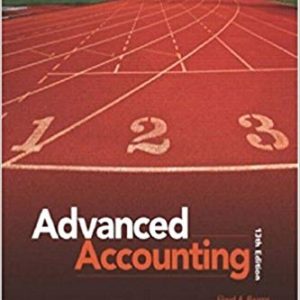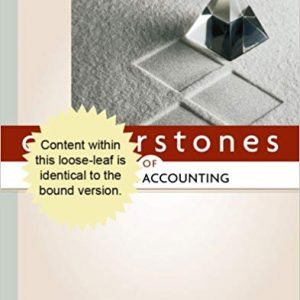No products in the cart.
ACCOUNTING
Cost Accounting A Managerial Emphasis Ninth_Canadian, 9th edition Srikant M. Datar Madhav V. Rajan Louis Beaubien Steve Janz solution manual
Cost Accounting A Managerial Emphasis Ninth_Canadian, 9th edition Srikant M. Datar Madhav V. Rajan Louis Beaubien Steve Janz solution manual
solution manual
Supply Chain Management A Logistics Perspective
( solution manual)
Supply Chain Management A Logistics Perspective
Edition:9th edition
Author Name: Srikant M. Datar Madhav V. Rajan Louis Beaubien Steve Janz
contact:
Whatsapp +1 (949) 734-4773
for the Facebook page click here
for more books for ( Test Bank and Solution Manual) click here
for the Solution Manual click here
sample free
$49.00 $80.00
Cost Accounting A Managerial Emphasis Ninth_Canadian, 9th edition Srikant M. Datar Madhav V. Rajan Louis Beaubien Steve Janz solution manual
solution manual
Supply Chain Management A Logistics Perspective
( solution manual)
Supply Chain Management A Logistics Perspective
Edition:9th edition
Author Name: Srikant M. Datar Madhav V. Rajan Louis Beaubien Steve Janz
contact:
Whatsapp +1 (949) 734-4773
for the Facebook page click here
for more books for ( Test Bank and Solution Manual) click here
for the Solution Manual click here
sample free
 Loading...
Loading...
CHAPTER 1
THE ACCOUNTANT’S VITAL ROLE IN DECISION MAKING
| MyLab Accounting Make the grade with MyLab Accounting: Select end-of-chapter questions can be found on MyLab Accounting. You can practise them as often as you want, and most feature step-by-step guided instructions to help you find the right answer. |
SHORT-ANSWER QUESTIONS
1-1 Management accounting measures, analyzes, and reports financial and nonfinancial information to internal managers making internal decisions to improve performance. The reporting and analyses are not restricted by generally accepted accounting principles (GAAP) based on either International Financial Reporting Standards (IFRS) or Canadian Accounting Standards for Private Exterprise (ASPE).
Financial accounting measures, analyzes, and reports primarily financial information to external parties who own the corporate assets, such as investors, government agencies, and banks. Methods of identification and classification of business transactions, measurement of their economic effect, analyses, and reporting in financial statements must comply with standards set by the Chartered Professional Accountants of Canada (CPA Canada).
Other differences include (1) management accounting emphasizes the future (not the past), and (2) management accounting is designed specifically to influence the behaviour of managers and other employees (rather than primarily reporting economic events).
1-2 In Canada, financial accounting is constrained by GAAP. Companies listed on stock exchanges must comply with IFRS. Other companies must comply with ASPE when reporting to external parties. Management accounting is not restricted to these principles. The result is:
- management accountants can charge interest on owners’ capital to help judge a division’s performance, even though such a charge is not allowed under GAAP
- management accountants can classify, measure, and include the value of internally developed assets and liabilities not recognized under GAAP
- management accountants can use measurement methods of the value of assets or liabilities not permitted under GAAP
- management accountants can change the method of revenue and expense recognition, which is not permitted under GAAP, and
- management accountants assess the quality of information provided based on how well it reflects the economic reality of a real business process, not a standard.
1-3 Management accountants help formulate strategy by identifying relevant information about the sources of competitive advantage—usually the cost, productivity, or efficiency advantage of their company relative to competitors. Alternatively, management accountants can analyze the benefits to customers and the costs to the company of adding features to further customize more distinctive products or services. These data will assist in setting an appropriate premium price for distinctive value-added attributes as determined by the customer.
1-4 The business functions in the value chain are
- Research and development—generating and experimenting with ideas related to new products, services, or processes.
- Design of products, services, and processes—the detailed planning and engineering of products, services, or processes.
- Production—acquiring, coordinating, and assembling resources to produce a product or deliver a service.
- Marketing—promoting and selling products or services to customers or prospective customers.
- Distribution—delivering products or services to customers.
- Customer service—providing after-sale support to customers.
1-5 The “supply chain” is a coordinated flow of goods, services, and information from each initial source of materials and services to the delivery of products to consumers, whether or not the supply activities occur in the purchasing or in other organizations.
Cost management is most effective when it integrates and coordinates activities across all suppliers in the supply chain as well as across each business function in the purchasing company’s value chain. Business functions can be restructured to be more cost-effective.
1-6 This statement is wrong. Management accountants also analyze revenues from products, services, and customers relative to their costs to assess the profitability of types of products, services, and customers. Management accountants also examine the business environment and report relevant information on the intensity of competition. Cost information is only one part of the relevant internal and external information identified, analyzed, and reported by management accountants.
1-7 Management accountants help a management team identify performance measures that are important to maintain or increase profitability. Important measures include features, quality, and timely delivery as determined by customers. For-profit companies use these data to evaluate the balance of costs and benefits—both financial and nonfinancial—and provide relative assurance that proposed changes will not impair profitability. Initiatives include TQM, relieving bottleneck constraints, or providing faster customer service.
1-8 The five-step decision-making process is (1) identify the problem and uncertainties,
(2) obtain relevant information, (3) make predictions about the future, (4) decide on one of the available alternatives, and (5) implement the decision, evaluate performance, and learn. Often the most important information required to provide certainty around predictions is missing, which is why rigorous and disciplined decision making is important to success.
1-9 Planning decisions include (a) selecting organization goals, (b) predicting results under various alternative ways of achieving those goals, (c) deciding how to attain the desired goals, and (d) communicating the goals and how to attain them to the entire organization. Good planning decisions indicate how rigorous and disciplined the management team is at making unbiased business decisions in the best interests of improving organizational profit.
Control decisions require the assessment of actual compared to planned or predicted outcomes and include (a) identifying performance outcomes and how to measure them,
(b) obtaining timely and high-quality feedback, (c) assessing how to improve actual performance, and (d) acting differently to improve the implementation of planning decisions. Good control decisions indicate how well a management team learns from its actual experience.
1-10 The three guidelines for management accountants are
- Employ a cost–benefit approach.
- Recognize behavioural and technical considerations.
- Identify relevance and understand that decisions require “different costs for different purposes.”
1-11 Agree. A successful management accountant requires general business skills (such as understanding the strategy of an organization) and people skills (such as motivating other team members) as well as technical skills (such as computer knowledge, calculating costs of products, and supporting planning and control decisions).
1-12 The new controller could reply in one or more of the following ways:
- Demonstrate to the plant manager how he or she could make better decisions if the plant controller was viewed as a resource rather than a busybody. The plant controller is the best person to show how the plant manager will benefit because his or her time and resources can be saved by bringing the plant controller into the decision-making process.
- Demonstrate to the plant manager a good knowledge of the technical aspects of the plant. This approach often requires research on customer preferences, the potential for growth in demand, plant-specific production or service processes, people, and suppliers. It certainly will involve spending time on the plant floor speaking to plant personnel to learn from their practical experience.
- Show the plant manager examples of the new plant controller’s past successes in working with line managers in other plants. Examples could include:
- assistance in reducing the plant manager’s time to prepare the budget,
- assistance in analyzing problem situations and evaluating financial and nonfinancial aspects of different alternatives, and
- assistance in submitting successful capital budget requests.
- Seek assistance from the corporate controller to highlight to the plant manager the importance of many tasks undertaken by the new plant controller. This approach is a last resort but may be necessary in some cases.
1-13 Steps to take when established written policies provide insufficient guidance are
- Discuss the problem with the immediate superior (except when it appears that the superior is involved).
- Clarify relevant ethical issues by confidential discussion with an impartial adviser.
- Consult your own lawyer about legal obligations and rights arising from ethical conflicts.







David (verified owner) –
finally, I can get A+
David –
Nicholas (verified owner) –
Very fast response
Nicholas –